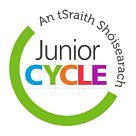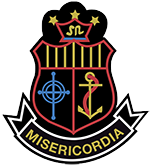In OLM we fully embrace the Junior Cycle. Students engage fully in Junior Cycle and their achievements are celebrated in three key areas: State Examinations Certificate. Junior Cycle Profile of AChievement (JCPA) and Junior Certificate Schools’ Programme (JCSP).
Junior Cycle takes over from the old Junior Cert and allows students to engage more and learn through dynamic and exciting teaching strategies in line with teaching in the 21st Century. Junior Cycle places the student at the centre of their education. It allows them to explore ideas, critically think about problems, and become part of their education throughout their three years in the programme. Click here to read the 2015 framework document on the reform.
Along with the final State Exam at the end of their 3rd year, students will also engage in Classroom Based Assessments (CBA) in 2nd and 3rd year. These are forms of continuous assessment that will allow the learner to reflect on their work to date and create something that they then put forward for marking. The results of these CBAs will then be marked on their Profile of Achievement at the end of 3rd year, along with their exam results. After their CBA in 3rd year, the students will also do an Assessment Task (AT) that helps them reflect on the work they have put into their CBAs and this is sent to the States Exam Commission (SEC) along with their exam book after the Junior Cycle Exams.
To get a breakdown and some more information about the Junior Cycle program click here.
For some students, the Level 3 Junior Cycle may not be accessible due to specific learning difficulties. OLM offers the Level 2 Learning Programme (L2LP). Students complete the majority of the L2LP during everyday lessons with their class group. Teachers adjust their expectations of students’ ability and record evidence so that these students can achieve at Junior Cycle and progress to Senior Cycle. Click here.
The Junior Certificate School Programme is a national programme sponsored by the Department of Education and Skills and the National Council for Curriculum and Assessment. Currently the programme is operating in over 240 schools throughout the country. Every student from 1st-3rd year in OLM is enrolled in JCSP. It assists teachers in making Junior Cycle more accessible to all youn people. It helps young people experience success and develop a positive self-image by providing a curriculum and assessment framework suitable to all needs. On completion of the programme students receive a JCSP profile which is an official record of their achievements from the Department of Education and Skills.
| Junior Cycle Descriptors Explained | |||||
| Grade | Percentage | ||||
| Distinction | ≥90 to 100 | ||||
| Higher Merit | ≥75 & <90 | ||||
| Merit | ≥55 & <75 | ||||
| Achieved | ≥40 & <55 | ||||
| Partially Achieved | ≥20 & <40 | ||||
| NG | ≥0 & <20 | ||||
| Classroom Based Assessment Descriptors Explained | |||||
| E | Exceptional | Student has excelled in assignment | |||
| AE | Above Expectations | Student is going above expectations expected at this stage | |||
| ILWE | In-Line With Expectations | Student is performing at the level expected of them at this stage | |||
| YTME | Yet to Meet Expectations | Student is not performing at the level expected at this stage | |||
| NR | Not Reported | No assignment presented to teacher for grading | |||


Students in OLM study English, Gaeilge, Maths, Science, a Modern Foreign Language (MFL), History and Religious Education (R.E.) as core subjects over three years and are assessed in each of these as part of their Junior Cycle.
All student complete 400 hours of wellbeing in P.E, CSPE and SPHE, over three years which are assessed on the profiles of achievement.
Other subjects that may be core or optional depending on the year include Business and Geography.
Students also choose from a range of practical subjects they would like to further their knowledge in, Music, Art, or Home Economics.
Finally all 1st year students complete a lifeskills module, which includes the basics of using computers correctly, something which helps them with CBAs in other subjects.
English
• to be creative through language and to gain enjoyment and continuing personal growth from English in all its forms
• to develop control over English using it and responding to it with purpose and effect through the interconnected literacy skills of oral language, reading and writing
• to engage personally with and think critically about an increasingly broad range of spoken, written and multimodal texts
• to develop an informed appreciation of literature through personal encounters with a variety of literary texts
• to use their literacy skills to manage information needs, and find, use, synthesise, evaluate and communicate information using a variety of media
• to gain an understanding of the grammar and conventions of English and how they might be used to promote clear and effective communication.
Gaeilge
Students are encouraged to
• use language effectively and confidently, both personally and in communicating with other users in the language community
• enjoy creative and innovative communication in Irish
• appreciate Irish and have a desire both to speak it and use it
• express themselves through consolidation of their literacy skills
• attempt to use newly-learned language aspects
• engage with a wide range of texts in various ways, for learning, research, and recreation
• have an appreciation and respect for literature in Irish so that they may enjoy literature and benefit from it
• gain a better understanding of Irish culture and have respect and understanding for other cultures and languages
Maths
• conceptual understanding—comprehension of mathematical concepts, operations, and relations
• procedural fluency—skill in carrying out procedures flexibly, accurately, efficiently, and appropriately
• strategic competence—ability to formulate, represent, and solve mathematical problems in both familiar and unfamiliar contexts
• adaptive reasoning—capacity for logical thought, reflection, explanation, justification and communication
• productive disposition—habitual inclination to see mathematics as sensible, useful, and worthwhile, coupled with a belief in diligence, perseverance and one’s own efficacy.
Science
• to develop a sense of enjoyment in the learning of science, leading to a lifelong interest in science
• to develop scientific literacy and apply this in cognitive, affective and psychomotor dimensions to the analysis of science issues relevant to society, the environment and sustainability
• to develop a scientific habit of mind and inquiry orientation through class, laboratory and/ or off-site activities that foster investigation, imagination, curiosity and creativity in solving engaging, relevant problems, and to improve their reasoning and decision-making abilities
• to develop the key skills of junior cycle to find, use, manage, synthesise, and evaluate data; to communicate scientific understanding and findings using a variety of media; and to justify ideas on the basis of evidence
• to acquire a body of scientific knowledge; to develop an understanding of Earth and space and their place in the physical, biological, and chemical world and to help establish a foundation for more advanced learning.
Geography
French
• actively engage in language activities and tasks, developing the capacity to understand written and spoken language
• communicate effectively and confidently in the target language in familiar contexts through a range of media
• develop their capacity to use appropriate structures and vocabulary for the purposes of communication, both written and oral
• enjoy a language-learning experience that will facilitate and encourage them to continue learning languages in future
• be reflective and autonomous in their language learning, and become actively involved in monitoring and assessing their progress
• appreciate their own and other cultures
• develop skills that they can apply to other areas of study and to their lives.
Spanish
• actively engage in language activities and tasks, developing the capacity to understand written and spoken language
• communicate effectively and confidently in the target language in familiar contexts through a range of media
• develop their capacity to use appropriate structures and vocabulary for the purposes of communication, both written and oral
• enjoy a language-learning experience that will facilitate and encourage them to continue learning languages in future
• be reflective and autonomous in their language learning, and become actively involved in monitoring and assessing their progress
• appreciate their own and other cultures
• develop skills that they can apply to other areas of study and to their lives.
History
Religious Education
Home Economics
Art
Technical Graphics
• develop the student’s creativity, spatial ability, and capacity to reason and communicate ideas through engagement with abstract and applied geometric problem-solving activities
• encourage the development of the cognitive and practical dexterity skills associated with graphical communication
• instil an appreciation of the role of graphics in the world around them
• equip all students to make judgements on the best mode through which to represent their ideas and solutions
• encourage the production of drawings that promotes the skills of communicating through graphics
• develop students cognitive and practical skills associated with modelling and graphical communication.
